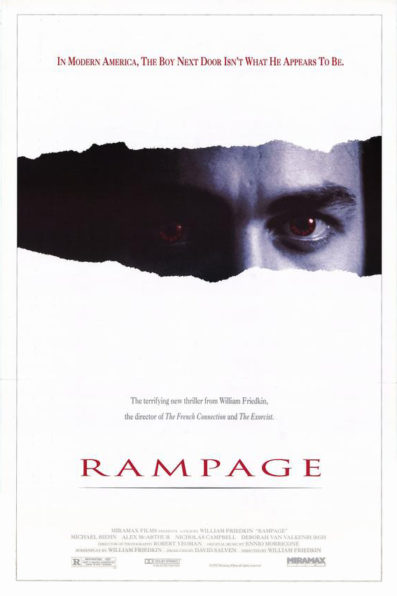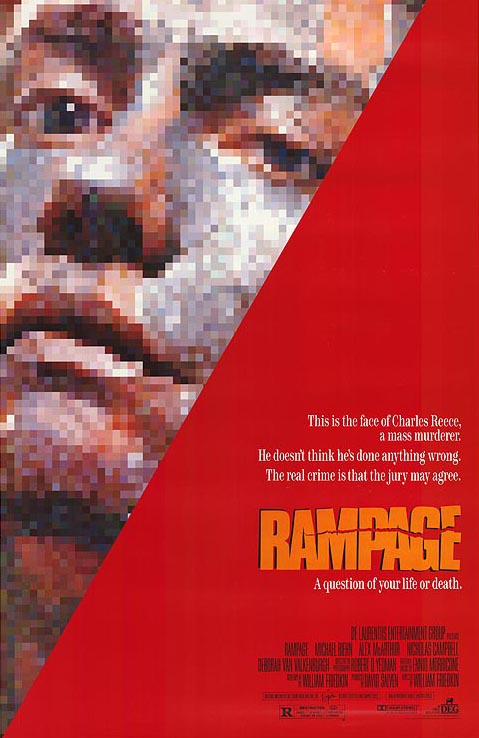 A companion-piece of sorts to HENRY: PORTRAIT OF A SERIAL KILLER. The latter, as you may recall, was a serial killer drama lensed in 1986 but not released until four years later, while RAMPAGE was a serial killer drama completed in 1987 by the late De Laurentiis Entertainment Group (or DEG), which went out of business before the film was distributed. For that reason it remained unreleased until 1992, with Harvey and Bob Weinstein (who never found a film property they couldn’t exploit) doing the honors.
A companion-piece of sorts to HENRY: PORTRAIT OF A SERIAL KILLER. The latter, as you may recall, was a serial killer drama lensed in 1986 but not released until four years later, while RAMPAGE was a serial killer drama completed in 1987 by the late De Laurentiis Entertainment Group (or DEG), which went out of business before the film was distributed. For that reason it remained unreleased until 1992, with Harvey and Bob Weinstein (who never found a film property they couldn’t exploit) doing the honors.
…unreleased until 1992, with Harvey and Bob Weinstein (who never found a film property they couldn’t exploit) doing the honors.
The film’s maker was the sometimes-great William Friedkin, of THE FRENCH CONNECTION and THE EXORCIST fame. He scripted and directed RAMPAGE, which exists in two different cuts: the 97 minute 1986 DEG version and the 1992 Miramax one, from which Friedkin removed 10 minutes. Both are disappointing.
A large part of the problem, I’d opine, was with the fact that in 1986 Friedkin was coming off a handful of TV projects (including the music videos for Laura Branigan’s “Self Control” and Wang Chung’s “To Live and Die in LA,” the NEW TWILIGHT ZONE episode “Nightcrawlers” and the TVM C.A.T. SQUAD). This explains why RAMPAGE, despite having been intended for the big screen, looks and feels like a 1980s TV movie (with DEG’s habitual corner-cutting being another likely culprit).
Adapted from William P. Wood’s 1985 novel of the same name (which was inspired by the 1977-78 doings of the “vampire killer” Richard Trenton Chase), it’s about the goateed Charlie Reece (Alex McArthur), a suave serial killer who lives with his mother (future David Lynch regular Grace Zabriskie). After slaughtering and eviscerating two suburban families, apparently because he wants their “life essence” (conveyed by subliminal shots of McArthur smearing himself with blood in a tiger cage), he’s caught by police and taken into custody.
The liberal district attorney Anthony Fraser (Michael Biehn) decides to seek the death penalty for Reece. He faces an uphill battle, as cunning opportunists seek to convince the jury that Reece is insane, and so not responsible for his actions—even after he slashes the throats of two policemen while being transported to the courthouse, and then kills a priest whose blood Reece smears on a church altar. He’s recaptured and the jury finds him guilty, but the verdict is overturned during the penalty phase, leaving Reece to spend the remainder of his life in an insane asylum.
 The 1987 cut of RAMPAGE contains a far more ambivalent depiction of the death penalty than the 1992 version, which is staunchly pro-victim (Friedkin later claimed his “feelings had changed” between ‘87 and ‘92). What registers in both versions is the admirably meticulous depiction of Reece’s arrest, in which the arresting officers have to track him down at his gas station workplace after raiding his house, which feels very real—or would, at least, if the filmmaking was stronger.
The 1987 cut of RAMPAGE contains a far more ambivalent depiction of the death penalty than the 1992 version, which is staunchly pro-victim (Friedkin later claimed his “feelings had changed” between ‘87 and ‘92). What registers in both versions is the admirably meticulous depiction of Reece’s arrest, in which the arresting officers have to track him down at his gas station workplace after raiding his house, which feels very real—or would, at least, if the filmmaking was stronger.
The 1987 cut of RAMPAGE contains a far more ambivalent depiction of the death penalty than the 1992 version, which is staunchly pro-victim…
The same can be said for Friedkin’s depiction of his protagonist’s torturous attempts at pushing through a verdict about which he himself (in the 1987 cut) is quite torn. Michael Biehn delivers an impassioned performance as Fraser (albeit with a distracting eighties buzz cut), but Alex McArthur isn’t nearly as strong as Reece, due largely to how the character was conceived. He springs from the dial-a-psycho school of crime movie screenwriting, being a delusional Nazi-loving freak whose modus operandi is never made too clear (outside the fact that he likes killing people).
The film’s ultimate failing is one that afflicted many an eighties movie (see EUREKA and JAGGED EDGE): it begins as a visceral thriller, only to end up as a talk-heavy courtroom drama. Friedkin does his best to maintain interest (as in Reece’s thoroughly implausible third act freeway escape, which exists solely to keep us awake), but the substandard supporting performances and shoddy production values keep the viewer at a constant remove.
Vital Statistics
RAMPAGE
DEG Entertainment/Miramax
Director: William Friedkin
Producer: William Friedkin, David Salven
Screenplay: William Friedkin
(Based on a novel by William P. Wood)
Cinematography: Robert D. Yeoman
Editing: Jere Huggins
Cast: Michael Biehn, Alex McArthur, Nicholas Campbell, Deborah Van Valkenburgh, John Harkins, Art LaFleur, Billy Green Bush, Ryde D. Applegate, Grace Zabriskie, Carlos Palomino, Roy London, Donald Hotton, Andy Romano, Patrick Cronin, Roger Nolan, Rosalyn Marshall, White Hertford, David A. Kimball
